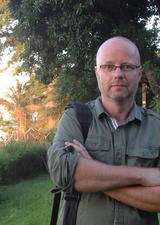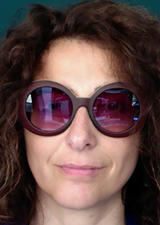
Cuthbertson Dialogues 2021
2021 Theme: Authority and Design / Designed Authority
Jan 13 2021
About DIALOGUES
The strategic initiatives at the University of Calgary and the School of Architecture, Planning and Landscape (SAPL) include a critical appraisal of cultural perspectives, assumptions, values, and norms by retracing designed authority and exploring the ways in which authority is distributed throughout design. Moving beyond raising awareness of relevant themes to applying them, the CUTHBERTSON DIALOGUES 2021 is an opportunity for students to discuss with people who can help, provoke or have successfully implemented the selected theme of authority and design. The DIALOGUES 2021 are focused on augmenting SAPL-student learning and inspiring them as they start the online Winter 2021 term. Moving beyond awareness, these sessions shift the education towards applications and ways to negotiate for a better world through design. Invited speakers represent adaptive leadership that strives with consideration, discipline, and responsibility.
This lecture series is made possible by Dr. Joanne Cuthbertson, OC, and Charlie Fischer, OC.
Program
On Wednesday January 13 2021 between 2.30- 4:40 pm (MST), six speakers will launch the 2021 winter term with the CUTHBERTSON DIALOGUES 2021 to augment the curriculum and inspire the student body.
Each session is 40 minutes long during which invited experts will frame the sessions with a 15-minute presentation leading to a 25-minute discussion with students.
Students should select three dialogues from the six offerings.
2:30pm–3:10pm

RE-SET
Speaker: Rob Voerman
The ideas behind the installation “The Exchange” from 2016 will be the starting point of this conversation. The focus will be on the currency developed for the project which makes a direct connection between ecology and the financial system. The idea of this new currency will be further developed in the coming years and be brought into actual circulation in future installations. The relation between the design of the work and the impact such a new currency can potentially have will be discussed. The second project to be showcased is “Places of Power” which will elaborate on the relations between the work, the engagement and impact it attempts in the world outside the arts.
Students are recommended to (pre)view the documentary PUSH: Housing Crisis in Modern Cities by film director, Fredrik Gertten and Fmr UN rapporteur on adequate housing, Leilani Farha, and look at Hans Haacke’s work where he tackles the role of project developers in New York in the 1960s and 1970s.
Discussion
Moderator: Marshall Evans
- What do students think should change within the design/architecture world or do they think design/architecture is moving in the right direction?
- How do students perceive the tension between making, design and the role of money and value? Architecture, and also design, are often linked to project developers and private equity firms in in-equality, rising rents and prices or real estate in larger cities, for example, Blackstone blackstone.com/the-firm, theguardian.com/us-news/2019/mar/26/blackstone-group-accused-global-housing-crisis-un
- Is this an issue for students and their future role in the world or not? If so, do they already have any ideas on how to anticipate this and act?
About the speaker
Rob Voerman (Deventer, Holland, 1966) works with different media: sculpture, photography, printmaking, drawing/painting and large installation-works both indoors and in public space, and soon, film. The decline of democratic structures, the danger of (neo-) capitalist money systems, the nature of political and other power systems and the major ecological threats based on our way of life for the planet — these are issues that Voerman examines in his work, analyzes and visualizes. Large installations also form platforms of discussion, encounters and artistic tools to engaged in certain topics and/or a local context. For “Places of Power”, he is building large models of places or buildings related to power (economical, financial, information, military, etc.), transformed by adding in, through and around the existing architecture, as a commentary on existing power-structures and systems, and inquiry about possible alternative systems and ideas. Voerman's work has been shown in many countries and his work is part of collections at MoMA, Hammer Museum and Stedelijk Museum.
robvoerman.nl →
Rob Voerman's Instagram @voermanr →
Rob Voerman's LinkedIn →

WHY I DRAW WITH ROBOTS
Speaker: Sougwen Chung
Discussion
Moderator: Darryl Pollock
About the speaker
Sougwen 䇤君 Chung is an artist and researcher whose work explores the dynamics between humans and systems. Her speculative critical practice spans performance, installation, and drawings which have been featured in numerous exhibitions at museums and galleries around the world. Chung is a former research fellow at MIT’s Media Lab and a pioneer in the field of human-machine collaboration.
In 2019, she was selected as the Woman of the Year in Monaco for achievement in the Arts & Sciences and was a featured speaker at TED in Mumbai, India. In 2018 she was an inaugural E.A.T. Artist in Resident in partnership with New Museum and Bell Labs, and was awarded a commission for her project Omnia per Omnia. In 2016, Chung received Japan Media Art’s Excellence Award in for her project, Drawing Operations.
She is a former research fellow at MIT’s Media Lab. She has been awarded Artist in Residence positions at Google, Eyebeam, Japan Media Arts, and Pier 9 Autodesk. In 2014, she was selected as one of the Top 20 New Visual Artists
by Print Magazine.
Her work has been exhibited internationally, including at the National Art Center, Tokyo; NTT InterCommunication Center [ICC], Tokyo, Japan; ArtScience Museum, Singapore; MIT Media Lab, Cambridge; The Drawing Center, New York; The New Museum (Sky Room), New York; Museum of Contemporary Art, Geneva; Mana Contemporary, New York, Tribeca Film Festival, New York; Sonar Festival, Barcelona. Her work has also been featured in Art In America, The New Yorker, Wired, Art F City, Forbes, Dazed and Confused, The Creators Project. She has spoken internationally at conferences including TED, Mumbai; Global Art Forum, Singapore; World Science Festival, New York; Cannes Lions, Cannes; WSJ's Future of Everything Conference, New York; Tribeca Film Festival Interactive, New York; OFFF, Barcelona.
Chung is a Chinese-Canadian artist and (re)searcher based in New York and Basel, Switzerland
3:15pm–3:55pm

HOUSING AS A KEY DETERMINANT OF HEALTH AND A HUMAN RIGHT: WHAT ABOUT OLDER LGBT CANADIANS?
Speaker: Jacquie Gahagan
This SSHRC-funded study aims to understand the unique housing issues facing older LGBT Canadians from three interconnected data points:
- International scoping review of existing housing policies and programs for LGBT populations,
- Online housing survey of housing providers and LGBT Canadians, and
- Focus groups with housing providers and LGBTolder adults in 5 Canadian cities.
This talk will offer highlights on key study findings and an opportunity for debate and discussion on potential solutions to addressing the gaps in meeting the housing needs of older LGBT Canadians, particularly in relation to the national housing strategy under 'vulnerable populations'.
Discussion
Moderator: Vivian Ton
- How does your work address the needs of vulnerable populations and housing?
- What are your thoughts on how the national housing strategy can be inclusive of the housing needs of older LGBT Canadians?
- What are your thoughts on possible innovative housing models and approaches for older LGBT Canadians such as intergenerational, congregate living facilities, among others?
About the speaker
Jacquie Gahagan, PhD, is a medical sociologist and full professor of health promotion
at Dalhousie University, a founding fellow of the MacEachen Institute of Public Policy and Governance, an affiliate scientist with the Nova Scotia Health Authority, and co-director of the Atlantic Interdisciplinary Research Network.
Jacquie Gahahan's website →
LGBTQ2S Housing Matters Project →

MIND THE GAP: DESIGN FOR ALL HUMANS
Speaker: Darby Lee Young
Drawing from years of experience navigating barriers in the social, cultural, and built environments as a person with a disability, this talk will focus on the importance of engaging people with diverse lived experiences at the outset of the design process as a step towards adopting a more inclusive and participatory approach to design. Understanding that all design is influenced by tradition, ideology, and personal assumptions; this talk will challenge students to critically introspect their ideas on empathy and inclusion when it comes to designing spaces and products that are universally accessible to all. By introducing the concept of disability-led design, this talk further elucidates the power that is traditionally embedded and distributed within the creative process and intends to advocate for people with disabilities to be seen not just as end-users of design, but as drivers of design.
Discussion
Moderator: Bushra Hachim
- How do you personally understand disability? And how do you think society understands disability? Is there a discrepancy between these two understandings?
- What are some of the assumptions you have about disabilities that might influence your design thinking?
- What challenges, if any, do you anticipate facing in adopting a disability-led design approach?
- How do you think ableism impacts design?
About the speaker
Darby has over a decade of experience working as an accessibility strategist. She established Level Playing Field in 2015 and is an expert in Universal Design and international accessibility guidelines and standards. Darby has successfully contributed to the removal of barriers at municipal, provincial and national levels, ultimately establishing inclusive environments. Darby’s expertise in Universal Design has developed throughout a wide range of public roles including her achievements as a competitive para-alpine skier. She is committed to contributing her unique lived-experience and various political appointments to passionately advocate for lasting inclusive environments that benefit everyone regardless of age or ability.
Darby Lee Young's LinkedIn →
Darby Lee Young Twitter →
Level Playing Field Facebook →
Level Playing Field LinkedIn →
Level Playing Field Instagram →
Level Playing Field Twitter →
4:00pm–4:40pm

FORENSIC ARCHITECTURE: LIVING ARCHAEOLOGIES
Speaker: Sarah Nankivell
Sarah Nankivell, Research Manager of Forensic Architecture (FA), will introduce FA’s methodologies through the lens of an ongoing investigation where FA’s techniques have been used to evidence heritage destruction caused by contemporary conflict and environmental damage. Using tools such as spatial and architectural analysis, open source investigation, and digital modelling, this investigation explores heritage as a human right and the complex challenges of preserving the many layers of history, ancient and contemporary, at this remarkable site.
Discussion
Moderator: Destiny Kirumira
- Heritage as process, much like forensics, has traditionally been a tool of the state. How can we use open source investigation and design techniques to: document sites; investigate threats to and destruction of heritage; and especially to engage and empower those communities who live with and care for these sites?
- What can we learn about human rights through the investigative lens of heritage destruction?
- How do we, as practitioners, balance the preservation of the past with the goals of the present? Should we?
About the speaker
Sarah Nankivell joined Forensic Architecture (FA) in 2017, having previously worked at B+H Architects, The Metropolitan Museum of Art, and The Aga Khan Museum. She is a graduate of the University of Toronto (BSc.) and the University of Cambridge (MPhil.), where her research focused on the destruction of heritage sites in conflict and the discursive representation of these events through the media.
Forensic Architecture website →
Forensic Architecture Instagram →

SPACES OF CRISIS AND CONFLICT
GLOBALIZATION, SOCIAL/SPATIAL INEQUITY, MARGINALIZATION, MIGRATION AND RIGHT TO THE LANDSCAPE
Speaker: Maria Gabriella Trovato
The landscape architecture profession is in a state of radical change to respond to the global challenges we are facing. Conflicts, environmental disasters, pandemics, food insecurity, climate change consequences – droughts, floods, starvation, soil depletion and impoverishment are widening disparities and exacerbating human mobility. The transformation we are witnessing in the last decades is leading to a societal shift and to the production of entirely new landscapes in which old and new narratives and memories are mixed up.
Scholars and intellectuals share the idea that there is a fundamental right to landscapes, considered as a right to healthy and culturally-rich environments that everyone is entitled to demand. Maria Gabriella's research questions the role of landscape design in envisioning scenarios at varying scales and phases of intervention to address the social and environmental emergencies. The objective is to work on defining liminal paths between humanitarian design, right to shared landscapes, and wellbeing of communities. There is a need to reconsider how we live on this planet in the context of demographic growth and human-induced environmental changes. The work she is conducting, as a practitioner, researcher and academic, acknowledges those challenges, focusing on humanitarian design and also fits into the objectives of Landscape Architects Without Borders, a group committed to working with vulnerable and disadvantaged communities, especially those affected by war, conflict and natural disaster, helping them to re-create safe, sustainable and dignified living conditions.
Discussion
Moderator: Emily Kaing
- Which tools and strategies could be developed in landscape planning and management to safeguard local community interests and needs while recognizing political and economic interests of the elite group?
- How to harmonize and coordinate the needs of the host and mass displaced and the mutual responsibilities towards spatial, cultural, economic, environmental, esthetical, and social aspects?
- How to contribute to social-environmental equity through landscape research that responds to pressing issues that the world is facing with an increased understanding of the landscape’s critical role and responsibility in the construction of the future of our territories?
About the speaker
Maria Gabriella Trovato is an Assistant Professor in the LDEM Department at the American University of Beirut. She holds a PhD (2003) from the University of Reggio Calabria and the University of Naples in Landscape Architecture: Parks, Gardens and Spatial Planning. Maria Gabriella's recent research focuses on landscape and social/environmental justice, landscape in emergency and new challenges, and landscape mapping and innovation in planning. Since 2017, she has been the Chair of the IFLA working group Landscape Architecture Without Borders (LAWB). With a group of international landscape professors, she is working on landscape in emergency research with special focus on Syrian informal settlements (ISs) in Lebanon exploring landscape methodologies that could permit the definition of a flexible, relational and creative strategy capable of managing continuous changing and transformations. She has worked in a number of countries including Italy, Morocco, Tunisia and Canada, and has been lead partner in EU-research programs.
